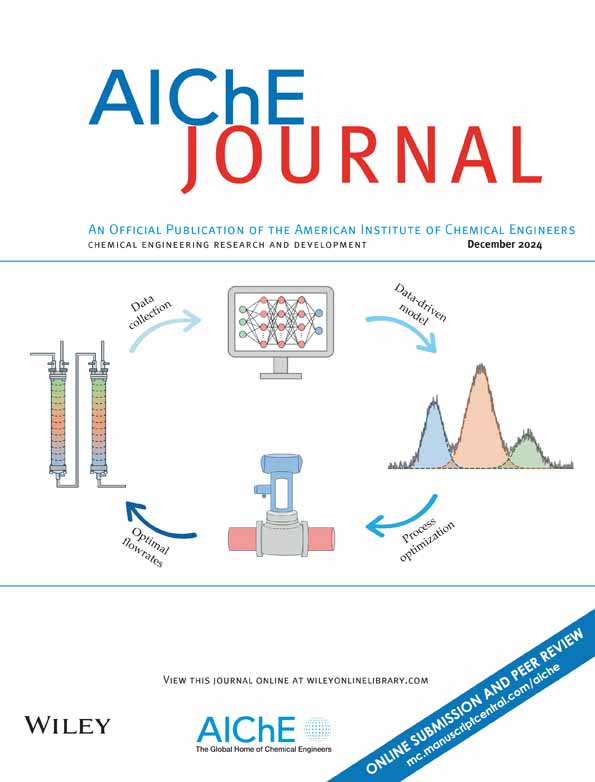Manipulating central intermolecular interaction in confined nanochannels for fast transport
IF 3.5
3区 工程技术
Q2 ENGINEERING, CHEMICAL
引用次数: 0
Abstract
The study of molecule transport within confined nanochannels is crucial to developing high-performance membranes. Previous studies mainly focus on the interfacial molecule transport; however, the central molecule transport, equally crucial, has been disregarded. Herein, vertically aligned vermiculite-based (Vr-based) membranes with long-range nanochannels are engineered to ensure a stable flow. Meanwhile, the channel surfaces are functionalized (–CH3, –NH2, and –CF3 groups) to tune the interaction with interfacial molecules, thus affecting the intermolecular interaction of central molecules. We demonstrate that strong channel-molecule interaction between polar walls and protonic solvents can impede the formation of hydrogen-bond networks in central molecules, thus reducing the central intermolecular interaction and enabling fast transport. For instance, the Vr-CF3 membrane displays a 69% improvement in water permeance in comparison to the Vr-CH3 membrane, achieving 13.0 LMH bar−1. Nevertheless, nonpolar walls with weak channel-molecule interaction show uninfluenced intermolecular interaction, giving comparable transport ability for both protonic and non-protonic solvents.在受限制的纳米通道中操纵中心分子间相互作用以实现快速运输
研究分子在受限纳米通道内的传输是开发高性能膜的关键。以往的研究主要集中在界面分子转运上;然而,同样重要的中心分子运输却被忽视了。在这里,垂直排列的蛭石基(Vr-based)膜具有远程纳米通道,以确保稳定的流动。同时,通道表面被功能化(-CH3、-NH2和-CF3基团)来调节与界面分子的相互作用,从而影响中心分子的分子间相互作用。我们证明极性壁和质子溶剂之间的强通道-分子相互作用可以阻碍中心分子中氢键网络的形成,从而减少中心分子间相互作用并实现快速传输。例如,与Vr-CH3膜相比,Vr-CF3膜的透水性提高了69%,达到13.0 LMH bar−1。然而,具有弱通道-分子相互作用的非极性壁显示出不受影响的分子间相互作用,对质子和非质子溶剂具有相当的传输能力。
本文章由计算机程序翻译,如有差异,请以英文原文为准。
求助全文
约1分钟内获得全文
求助全文
来源期刊

AIChE Journal
工程技术-工程:化工
CiteScore
7.10
自引率
10.80%
发文量
411
审稿时长
3.6 months
期刊介绍:
The AIChE Journal is the premier research monthly in chemical engineering and related fields. This peer-reviewed and broad-based journal reports on the most important and latest technological advances in core areas of chemical engineering as well as in other relevant engineering disciplines. To keep abreast with the progressive outlook of the profession, the Journal has been expanding the scope of its editorial contents to include such fast developing areas as biotechnology, electrochemical engineering, and environmental engineering.
The AIChE Journal is indeed the global communications vehicle for the world-renowned researchers to exchange top-notch research findings with one another. Subscribing to the AIChE Journal is like having immediate access to nine topical journals in the field.
Articles are categorized according to the following topical areas:
Biomolecular Engineering, Bioengineering, Biochemicals, Biofuels, and Food
Inorganic Materials: Synthesis and Processing
Particle Technology and Fluidization
Process Systems Engineering
Reaction Engineering, Kinetics and Catalysis
Separations: Materials, Devices and Processes
Soft Materials: Synthesis, Processing and Products
Thermodynamics and Molecular-Scale Phenomena
Transport Phenomena and Fluid Mechanics.
 求助内容:
求助内容: 应助结果提醒方式:
应助结果提醒方式:


